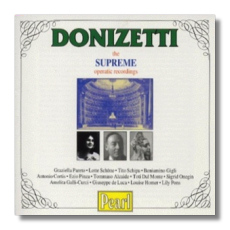
The Internet's Premier Classical Music Source
Related Links
- Donizetti Reviews
- Latest Reviews
- More Reviews
-
By Composer
-
Collections
DVD & Blu-ray
Books
Concert Reviews
Articles/Interviews
Software
Audio
Search Amazon
Recommended Links
Site News
 CD Review
CD Review
Gaetano Donizetti

The Supreme Operatic Recordings
- 16 Arias, Duets, and Scenes
Graziella Pareto, Lotte Schöne, Amelita Galli-Curci, Toti Dal Monte, Lily Pons, sopranos
Sigrid Onegin, Louise Homer, contraltos
Beniamino Gigli, Tito Schipa, Antonio Cortis, Tommaso Alcaide tenors
Willi Domgraf-Fassbänder, Giuseppe de Luca, baritones; Ezio Pinza, bass
Pearl GEM0075 ADD monaural 75:55
Here's another compilation produced in collaboration with The Record Collector, an English publication edited by Larry Lustig and "dedicated to the great singers of the past." I previously reviewed a similar disc containing music by Verdi (Pearl GEM0072), and collections devoted to Wagner, Mozart, Rossini, Puccini, and Bellini also are available, or will be shortly. As with the Verdi compilation, it is not reasonable to assume that a single 75-minute disc is going to include all the great 78-rpm recordings of Donizetti's music. What Donizetti – The Supreme Operatic Recordings has to offer is a well-chosen and varied program for those evenings – all too frequent lately! – when one is too tired to feed discs into the CD changer.
The disc opens with its only acoustic selection: Graziella Pareto's 1920 recording of "Quel guardo il Cavaliere" from Don Pasquale. The sound quality is strong, however, and the singing is characterful and charming. Pareto, a Spanish soprano born in 1889, was new to me. The rest of the selections were recorded between 1925 (the dawn of the electric era) and 1932. These dates find singers such as Gigli and Schipa at their early best. In contrast, by the middle and late 1920s, Galli-Curci's voice was beginning to decline, but "Tornami a dir" from Don Pasquale (with Schipa) and the Lucia sextet (where she is joined by Gigli, Pinza, de Luca, Homer, and tenor Angelo Bada) find her still in good voice. Indeed, the latter is one of the most durable operatic recordings ever, and it's hardly ever been unavailable in one form or another.
As with the earlier collection, there are interesting and pleasant surprises. Schöne and Domgraf-Fassbänder perform the Don Pasquale duet ("Pronta io son… Vado, coro") in German. The vivid and lively singing negates any risk of heaviness; you might almost convince me that they're performing the duet in its original language. Alcaide, another singer previously unknown to me, was Portuguese, and his "Spirto gentil" from La Favorita shows him to have been capable of a Schipa-esque lightness. Schipa himself is heavily represented here ("Adina, credimi" from L'Elisir d'Amore is heartbreakingly lovely), as is Gigli. I praise Lustig for choosing Gigli's 1927 recording of what amounts to practically the entire Tomb Scene from Lucia. These longer stretches of music allow us to gain a greater feel for what it must have been like to hear a singer on the operatic stage. Gigli makes a powerful impact here without being bombastic or lachrymose. I was pleased also to find two recordings by Toti Dal Monte, a great Italian coloratura who participated (with Gigli) in one of the finest recordings of Madama Butterfly. "Chacun le sait" from La Fille du Régiment and "O luce di quest' anima" from Linda di Chamonix sparkle, and they highlight her distinctive timbre.
The transfers are by Roger Beardsley, and he has taken great care to find good copies. Surface noise is present but never obtrusive. The earlier electric recordings do suffer on occasion from slight overloading and other microphone-related problems. There's not much that any producer can do about that, however. Given the musicianship on these discs, it's not something that will inhibit any reasonable person's enjoyment.
Copyright © 2000, Raymond Tuttle


















